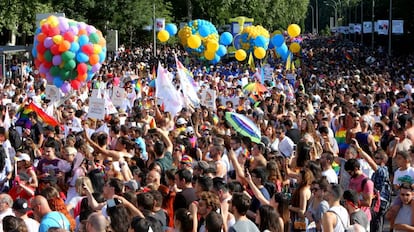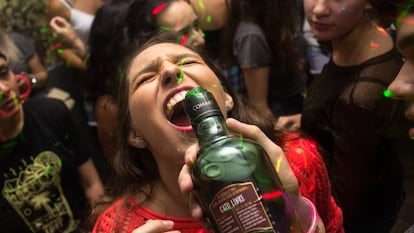When partying gets out of control: Spanish police overwhelmed by outsized fiestas
Events involving large crowds of youths are increasingly ending in reports of assault, theft and even rape


It is the eve of another national holiday and thousands of young people are drinking and having a good time in a confined space long after midnight. Police are concerned. This is exactly the kind of scenario that leads to incidents involving sexual abuse, brawls and arrests. And it is the kind of event that has proved unmanageable on more than one occasion.
This year has seen multiple fiestas end in tears. But neither the National Police nor the Civil Guard have official statistics. They maintain that the system makes no allowance for registering that a reported incident took place at an outdoor party, and that any data is, in any case, in the hands of the Secretary of State for Security.
Cellphone thieves go to these gatherings and have a field day
Police spokesperson
The last mass gathering that caused trouble was on November 1 in Tres Cantos, at the tail end of Halloween celebrations. Two Civil Guard officers were injured; one of them had his nose broken.
“These things need a lot of planning,” says a Civil Guard spokesman. “It means a lot of policing is required, which in turn means putting in extra hours and working on vacation days. We are understaffed.”
Mobile discos that move around like the Pied Piper, attracting hordes of youngsters, have also proved challenging to control. While there is the option of stopping the music, the resulting conflict is sometimes not worth it.

Then there is the not insignificant matter of theft. “Cellphone thieves go to these gatherings and have a field day,” says a police spokesman. “They know how to take advantage of carelessness or drunkenness to get hold of the phones.”
Another more alarming tendency that has come to light in recent months involves sexual attacks on young women and minors. Incidents were reported at the local fiestas in Alcorcón, Las Rozas, Majadahonda and the Barrio del Pilar neighborhood in the city of Madrid. The police maintain that due to La Manada case – when an 18-year-old girl was assaulted at the 2016 Running of the Bulls in Pamplona – victims now feel braver about coming forward to report abuse. “The same thing is happening with gender violence,” says a Madrid police officer. “People are increasingly aware of it.”
Serious offenses during Gay Pride
One of the most popular fiestas in the Spanish capital is Madrid Pride (MADO). The Madrid Observatory against LGTB Phobia has a record of incidents that took place this year. Two men between the ages of 18 and 25 were raped, only one of whom reported the incident. The Arcópoli Association, which is linked to the Madrid Observatory against LGTB Phobia, insists that this is the first time there have been rape cases at the event, at least on record.
During Mado 2018 there were 35 incidents reported, including three physical assaults, 12 verbal attacks and damage to property.
Abuse cases at fiestas in and around Madrid have involved women and girls between the ages of 14 and 18, while their attackers have been individuals or groups of men older than them but under 25.
In towns such as Pinto, the local council has decided to suspend macro-discos on account of the problems they generate. In 2017, there were stones and bottles and even paving stones hurled at the police and the Civil Guard officers watching over the area.
But the most serious violence occurred in San Agustín de Guadalix, in the north of the Madrid region, when a 19-year-old died from stab wounds during the fiestas. “A lot of problems happen because youngsters pour in from other towns and think they can throw their weight around with no consequences,” says a National Police source.
The National Police say that their workforce is not big enough to control thousands of people at a time. “We do get reinforcements from the riot unit, but not always, and not in the appropriate numbers. And we ourselves don’t have the training nor the means to tackle a problem this size,” says the source.
English version by Heather Galloway.
Tu suscripción se está usando en otro dispositivo
¿Quieres añadir otro usuario a tu suscripción?
Si continúas leyendo en este dispositivo, no se podrá leer en el otro.
FlechaTu suscripción se está usando en otro dispositivo y solo puedes acceder a EL PAÍS desde un dispositivo a la vez.
Si quieres compartir tu cuenta, cambia tu suscripción a la modalidad Premium, así podrás añadir otro usuario. Cada uno accederá con su propia cuenta de email, lo que os permitirá personalizar vuestra experiencia en EL PAÍS.
¿Tienes una suscripción de empresa? Accede aquí para contratar más cuentas.
En el caso de no saber quién está usando tu cuenta, te recomendamos cambiar tu contraseña aquí.
Si decides continuar compartiendo tu cuenta, este mensaje se mostrará en tu dispositivo y en el de la otra persona que está usando tu cuenta de forma indefinida, afectando a tu experiencia de lectura. Puedes consultar aquí los términos y condiciones de la suscripción digital.








































